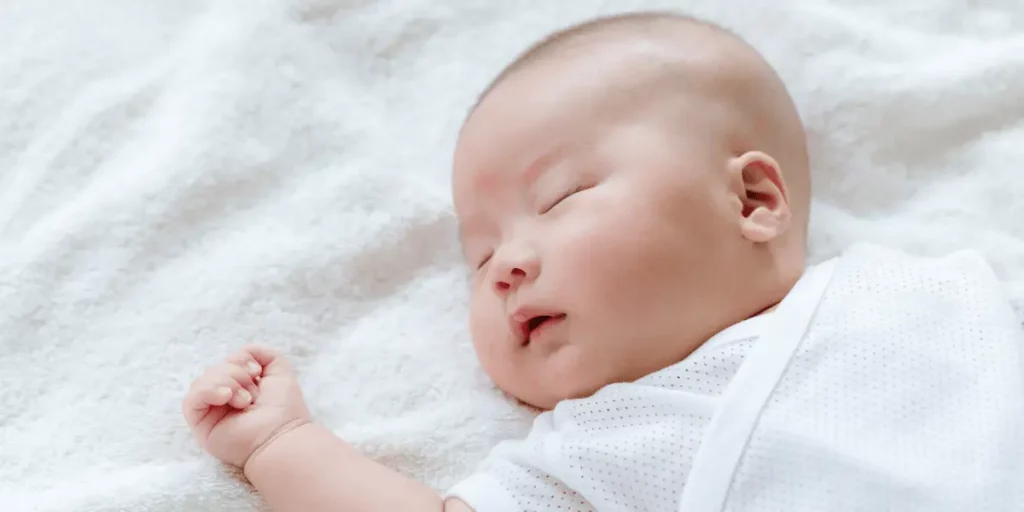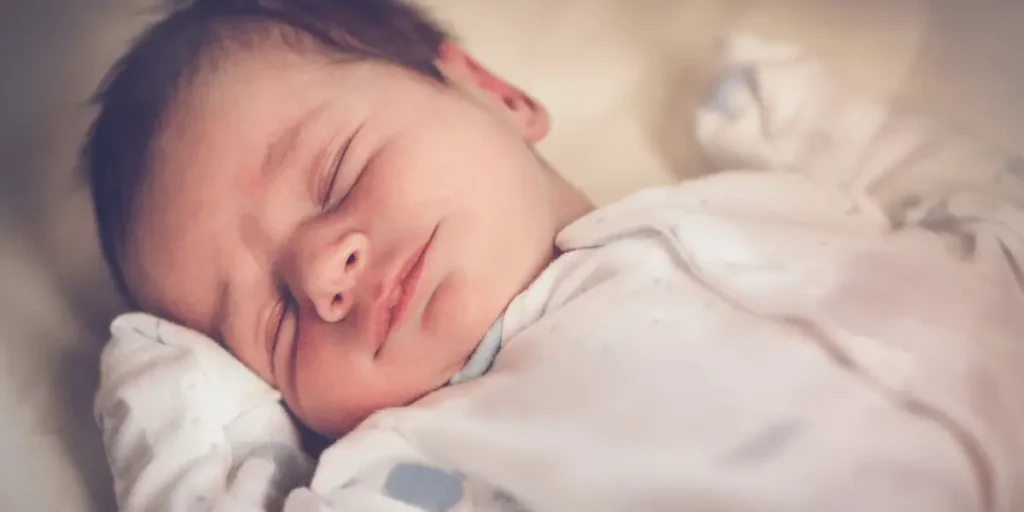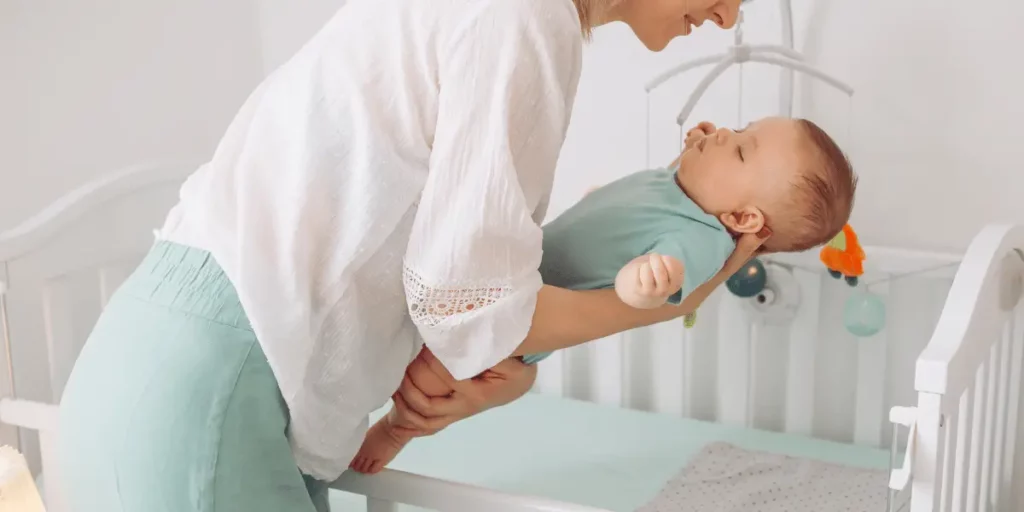
If you’re a new parent in need of newborn sleep tips, look no further. Newborn babies need a lot of sleep to grow and develop properly.
In this blog post, we will discuss everything from how much sleep newborns need to help your babies fall asleep for longer periods.
Why Is Sleep Very Important for Newborns?
Newborns need sleep in order to grow and develop properly. When they are asleep, their bodies are able to rest and heal. Additionally, sleep helps newborns to regulate their moods and emotions.
However, falling asleep is not always easy for babies. Therefore, keeping a newborn sleep schedule can help you keep the baby awake at the right times for feeding or diaper changes.
Below are other benefits of sleep for newborns:
- Helps with brain development
- Regulates their appetite
- Improves immunity
- Regulates breathing and heart rate
- Reduces stress levels
How Much Sleep Do Newborns Need?
Aside from breast milk, newborn babies thrive on sleep. In their first few weeks of life, they sleep an average of 16 hours a day, broken up into shorter periods of 2 to 3 hours each, but sleep patterns may vary per baby.
This may sound a lot, but remember that newborns wake up often to eat and have little control over their sleep patterns.
A newborn baby’s sleep cycle typically has 2 stages of sleep: active sleep and quiet sleep.
During active sleep, they usually move, groan, or make noises and can be woken up easily. Meanwhile, newborns in quiet sleep are less likely to be woken up and have regular breathing patterns.

6 Best Tips For Newborn Sleep
As parents, you need to ensure that your babies get enough sleep. Here are some tips to help your baby settle to sleep.
1. Make Sure the Room is Cool and Dark
Babies are more likely to wake up if they feel too hot or cold. The ideal room temperature should be between 68 and 72 degrees Fahrenheit. You can use an air conditioner or heater to regulate the room temperature.
You can also use blackout curtains to keep the room dark and prevent any distractions while your little one sleeps. Placing a nightlight near the baby’s crib can be helpful when you want to monitor your child without disturbing them.
2. Keep the Bedroom Quiet
Babies are very sensitive to sound because their ear canals are still developing. So, loud noises can startle them and wake them up. Try to keep the noise level down in the house when your baby is sleeping.
If you prefer to room share with your little one, avoid talking loud with your partner or using loud appliances while your newborn sleep.
3. Do Not Disturb Your Baby’s Sleep
Parents should not try to wake their baby up from sleep unless it is absolutely necessary, as it may trigger their startle reflex.
Also known as the Moro reflex, babies tend to jump or jerk awake when stimulated by sudden movement or loud sound. Once awake, it may be harder for your little one to go back to sleep.
Make sure to also get quality baby gear, such as a bassinet or crib, that is stable, sturdy, and approved by the Consumer Product Safety Commission.
4. Swaddle the Baby or Use a Sleeping Bag
Swaddling keeps babies warm and helps them feel secure as it mimics the womb. Newborn sleeping bags can also help your baby settle to sleep through the night.
If parents don’t want to swaddle their baby, they can use a sleeping bag. Sleeping bags are designed to keep babies warm and help them achieve peaceful sleep.
5. Maintain a Stimulation-free Environment
Create a comfortable, stimulation-free environment for your children. Avoid using bright lights and anything that may produce loud noises or strong odors.
Some newborns sleep through white noise, so getting a white noise machine to block out other noise and soothe them as they sleep might be helpful.
Removing other distractions, such as plush toys, blankets, and bumper pads, during bedtime also decreases the risk of sudden infant death syndrome. Along with this, experts don’t recommend bed sharing with a baby as they sleep.
Instead, room sharing is ideal so that you can still monitor your child, and attending will be easier once your baby wakes.
6. Avoid an Overtired Baby
Overtired babies have a harder time falling asleep and staying asleep since their bodies release cortisol, the hormone responsible for our fight or flight response.
When babies become overtired, their bodies release the stress hormone cortisol. This makes it difficult for them to relax and fall asleep. Make sure to watch out for signs of fatigue, such as yawning, rubbing their eyes, or becoming fussy.
You can create a consistent bedtime routine, so your child will begin to settle into their sleep cycle.
What Causes Babies To Wake Up Suddenly?

Nothing is more stressful for parents than a crying baby in the middle of the night.
There are many things that can cause a baby to wake up suddenly. Some of the most common reasons why newborns wake up suddenly are:
Your Baby Is Hungry
Babies often need feeding after three hours of nap. Some of the other signs that your baby is hungry include rooting, sucking on their fingers, or putting their fist in their mouth. If you see these signs, it’s time to feed your baby.
Some parents adjust to nighttime feeding so their little ones can sleep for longer stretches of time.
They Need Diaper Change
As babies can’t communicate using words yet, crying is the best way to let parents know it’s time for a diaper change. One of the most common reasons they cry is to have their diapers changed every two to three hours.
Some of the other signs that your baby’s diaper needs to be changed include squirming, fussing, or crying. Make sure to immediately change their diaper as soon as you see these signs to avoid rashes or skin irritations.
They Feel Too Hot or Too Cold
Another common reason why babies wake up at night is that they are too hot or too cold. Babies have a hard time regulating their body temperature. So, it’s important to ensure your baby’s room is at the perfect temperature.
Watch out for signs of overheating, such as feeling hot to the touch, redness, or sweating. Overheated babies can become fussy and restless, and therefore be harder to put to sleep.

They Were Woken by a Loud Noise
As we mentioned, babies get startled easily. To avoid this, make sure to keep the noise level down in your house. You can also use a white noise machine to help drown out any outside noise.
They Are Not Tired Anymore
Your baby will wake up when they are no longer tired. Babies who are able to sleep soundly for more than two hours are usually full of energy and require a bit of playtime. Play with your baby or talk to them to encourage bond and quality time.
Conclusion
Sleep is very important for babies. It helps them to grow and develop properly.
However, sometimes it can be hard for parents to get their baby to sleep through the night. If you’re having trouble with your baby’s sleep, don’t worry.
There are many things that you can do to help your baby sleep better. Try out the tips above and see which ones work best for you and your baby.
With a little patience and perseverance, you’ll be sure to get your baby sleeping through the night in no time!


Leave a Reply